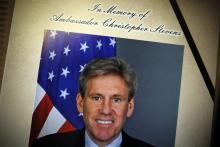hate

The question for me as a teacher is not so much "What could have been?" as it is "What can be?"
I think of my fourth grader holding signs that say, "I am MLK," "I am Anne Frank," "I am Harvey Milk," "I am Daniel Pearl," "I am James Byrd, Jr.," "I am Matthew Shephard," and "I am Yitzhak Rabin." Though she cannot really be them, she certainly can take up their work and carry it on in her own life. She wants to become a doctor so she can help people live. With that spirit, she will help these martyrs live, too.
As a teacher, it is my job not only to help students imagine a world without hate, but also to help them find the tools and the heart to build it.

Pastor Rick Warren, the best-known name in American evangelism after Rev. Billy Graham, lost his 27-year-old son, Matthew, to suicide on Friday.
In the days since, uncounted strangers have joined the 20,000 congregants who worship at the megachurch network “Pastor Rick” built in Southern California, Warren’s nearly 1 million Twitter followers and hundreds of thousands of Facebook followers in flooding social media with consolation and prayer.
“Kay and I are overwhelmed by your love, prayers, and kind words,” Warren tweeted on Sunday. “You are all encouraging our #brokenhearts.”
But a shocking number are taking the moment of media attention to lash out at Warren on their digital tom-toms. The attacks are aimed both at him personally and at his Christian message.

Picketing the funerals of soldiers. Protesting against female pastors. Condemning gays and lesbians to hell. You name it, the members of Westboro Baptist Church have done it.
As the June 2012 cover story of Sojourners magazine illustrates, Westboro has become “The Face of Hate.” But thanks be to God, that is not the end of the story.
In a shocking turn of events, Megan Phelps-Roper — granddaughter of Westboro Baptist founder Fred Phelps — recently left the flock along with her younger sister Grace Roper. Abandoning family, friends, and everything they have ever known, the two sisters have publicly denounced their connection with Westboro and the gospel of hate that consumed their lives for so long.

Joe Scarborough said what a lot of Americans are thinking as they watch anti-American protests and embassy attacks in many places across the Muslim world.
"You know why they hate us? They hate us because of their religion, they hate us because of their culture, and they hate us because of peer pressure," Scarborough said on the MSNBC program "Mornin Joe" on Sept. 17.
"And you talk to any intelligence person, they will tell you that's the same thing, and all those people who think we're going to go over there and change them are just naive. ... They hate us because of waterboarding? No they don't. They hate us because they hate us. They hate us because of Obama's drone attacks? No they don't. They hate us because they hate us."
Now Joe would be the first to admit that “they hate us because they hate us” is ... somewhat lacking in analytical depth. But it’s even worse than that. It is a foolish step down an oil-slick slope into a deep, old rut that runs in a vicious, dangerous circle.

I’ve been reflecting on the recent events in Libya involving the death of Ambassador Chris Stevens, and every time, I arrive at a different feeling about it all.
There’s the obvious tragedy of a life unnecessarily lost. By all accounts, Stevens was a humble, passionate man who had invested his life in the betterment of the infrastructure for the Libyan people. He was not, as some dignitaries or diplomats tend to be, resting on his credentials in an easy gig, waiting for retirement. He was living out what he believed in a terribly volatile corner of the world.

Physical violence is what happens when the violent force of words is not enough.
It’s possible that we are just beginning to see the start of that in our world today. The words, language, and rhetoric within politics and religion is growing in intensity all the time. Insults, name-calling, and unfounded accusation are normal and even expected.
When one side is called out for their language, they simply excuse themselves, pointing out that their opponent is doing the same thing. So it goes. But what happens when the force of the rhetoric reaches its limit? Violence.

I know, Christians, love everyone and everything, right? Mister Bluebird on my shoulder and all that jazz.
Well, that ain’t me. Not that I don’t try, but I also don’t try to fake it when I’m not feeling the love.
My wife, Amy, told me that one reason she married me was because she knew she could trust me. It seemed to her that I lacked the capacity to lie. And while this is reassuring on one level, the stark honesty can sometimes be a little jarring, I expect.
What I have found is that naming things out loud is the best way to help you get over them. Some of these might seem like relatively trivial things to you, but trust me – for a quasi-Aspie like me, they are often the bane of my existence.
So without further adieu, here’s a list of things that I can’t seem to shake, they annoy me so incredibly much. God, grant me the serenity to accept the things I cannot change...inside the blog.

Today (Oct. 4) Christians around the world celebrate the life of St. Francis of Assisi, one of the bright lights of the church and one of the most venerated religious figures in history.
The life and witness of Francis is as relevant to the world we live in today as it was 900 years ago. He was one of the first critics of capitalism, one of the earliest Christian environmentalists, a sassy reformer of the church, and one of the classic conscientious objectors to war.
Tomatoes. Uganda. Fair Trade. Here's a little round up of links from around the Web you may have missed this week:
- Are you living in a food desert? Here's a map that will tell you.
- Stop the hate in Uganda.
- This Saturday is World Fair Trade day. (What is fair trade, you ask?)
- The U.S. Conference of Catholic Bishops asks Senator John Boehner for a budget that "reduces future deficits, protects the poor and vulnerable people, advances the common good, and promotes human life and dignity."
- Continue praying for Egypt.
- Mark Bittman visits Immakolee, Florida, America's tomato capital.
- Easy Korean cooking for beginners.
- A cheerful video for you: coffee time.
[Editors' note: Below is a hymn written by Carolyn Winfrey Gillette lamenting gun violence. We hope you find it helpful in light of the shootings in Arizona.]
Certain moments in our nation's history have consistently opened the door for the least civil voices to enact evil through civil policy: think the institution of race-based U.S. slavery, the Indian removals, Jim Crow laws, legalized segregation, the federal protection of lynching mobs, and, don't forget, the Japanese internment camps, among others.
[Read more of this blog conversation in response to the Sojourners magazine article "
I got up at 4:30 a.m. on Tuesday morning to fly to Phoenix, Arizona, to speak at a press conference and rally at the State Capitol at the invitation of the state's clergy and other leaders in the immigration reform movement.
The world is stubborn. It changes its thinking at a glacial pace. People fear change, and they come to hate what they fear. Powerful interests do not want to lose or to share power. The work of social justice, of affecting positive change requires persistent commitment and radical love that gives one the energy to continue the work across decades.
